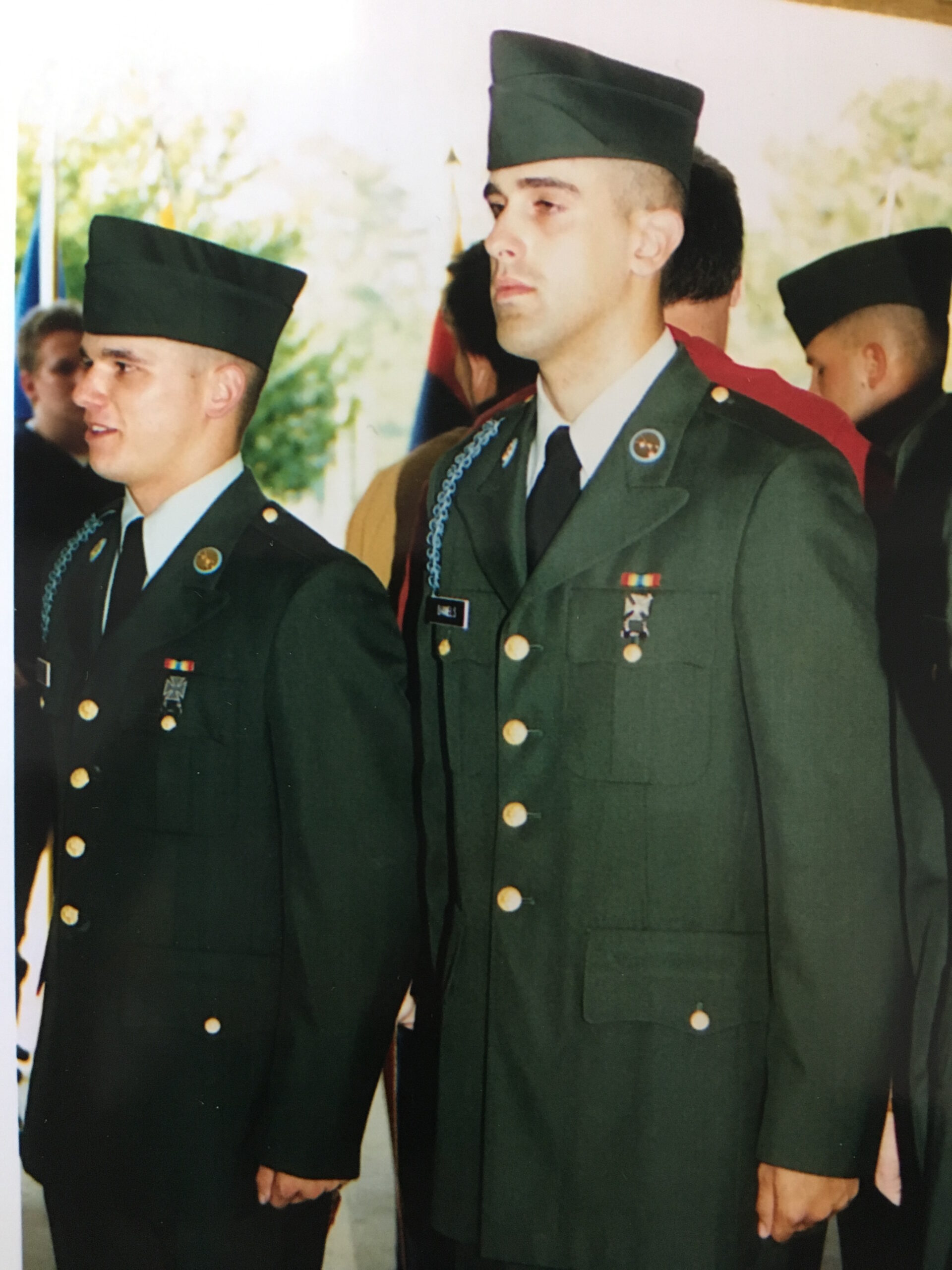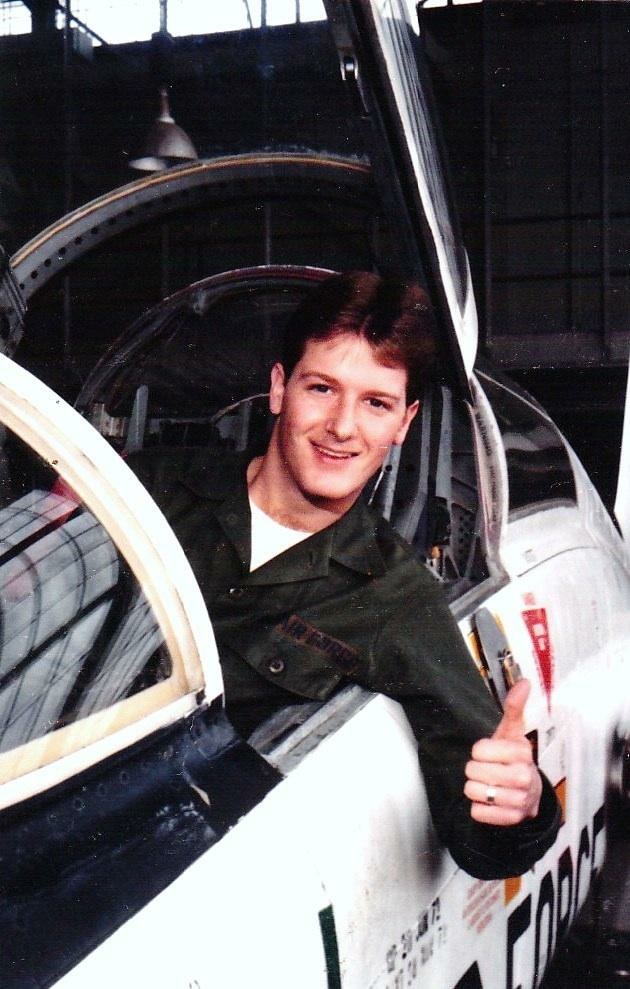Proud to serve: Bowdoin veterans reflect on their service
November 15, 2019
Allen Daniels, Bowdoin security officer first class, warned me that he was going to cry during our interview.
“I can’t block it out,” he said of his time in the military. “It’s like a watermark. It’s always there, over the image that is real life. Sometimes the watermark is very opaque, and you can’t see through it at all, other times it’s practically translucent.”
An hour into our chat, tears dripped onto his beard as memories resurfaced and the watermark became more pronounced.
 Courtesy of Allen Daniels
Courtesy of Allen DanielsDaniels served in the Old Guard from 1997 to 2001. For his whole military career, he was stationed at Fort Myer, right outside Arlington National Cemetery and just half a mile from the Pentagon. Much of his service was non-combat. The Old Guard primarily conducts memorials for dead soldiers and escorts officials, such as the President. Daniels spent most days marching in funeral services and most nights preparing for those events—pressing his uniform, shining his shoes, cleaning his ceremonial belt and pinning his badges back on in their precise location.
“We’re government-paid pretty boys,” he joked.
His job became less orderly when, after the September 11, 2001 attack at the Pentagon, he spent three days in the building helping to find and identify the dead.
“I have no recollection after those first few hours in the Pentagon on 9/11,” Daniels said, pausing between sentences to take slow sips of his now-cold coffee. “But I do remember filling and refilling my pockets with flags. Wire flags. Landscaping flags of two different colors. One was to mark airplane parts. The other was for biological parts.”
As planned, he was discharged from the military just a week after 9/11. And for the next 17 years, he blocked out those memories, disconnecting himself from his final few days of service.
Last year, however, at a reunion in Washington, D.C. with many other soldiers from his unit, the memories returned.
At a dinner, a friend from Daniels’ platoon turned to him and said, “You don’t know it, but you’re fucked. I’ve heard you talk about it, and you need to process it more, we all do. Just don’t hesitate to get help.”
The next day, Daniels drove back to Bowdoin, pulling over frequently to cry and wipe his eyes, attempting to “clear away the images.” The trip should have taken him 10 hours. Instead, it took 36.
When Daniels told me about his time in the Pentagon, he didn’t bawl like he did on that car ride. We sat in a corner in the David Saul Smith Union. A tour walked by, students printed their readings for class and facilities set up chairs for an event. Daniels’ eyes were wet, but he remained composed and unashamed. A year after being diagnosed with post-traumatic stress disorder (PTSD) and starting therapy, he welcomes the opportunity to chat about his past.
“The military culture isn’t to talk about [PTSD],” he said. “But at Bowdoin, in this environment, there are resources to help you, and people are willing to push you toward these resources. It’s amazing.”
When he got back from his reunion in D.C., Daniels talked to a Bowdoin counselor, who helped him navigate the employee assistance program, find a therapist off-campus and ultimately go on short-term disability for four months. All the while, he biked, rhythmically pedaling, clocking mile after mile.
For Daniels, biking is a form of physical meditation. In 2016, he earned his security cycling instructor certification from the International Police Mountain Bike Association (IPMBA) and became the first bike patrol officer at the College. He has since trained almost every other officer on staff, and next June he will lead a workshop about biking as a therapeutic approach to PTSD at an IPMBA conference.
This year on 9/11, he rode 184 miles in one day to honor the 184 victims of the 2001 attack on the Pentagon. He raised money for the Windy Warrior’s Adrenaline Therapy Program, which helps veterans recover from PTSD through activities, such as skydiving, that are fun and safe but recreate the heightened sensory levels associated with training and combat. Daniels was able to raise enough money to pay for 10 veterans to spend a day in the air.
Aside from supportive coworkers and a “fantastic benefits program,” Daniels is grateful that his job at Bowdoin allows him to bike every day. As the snow begins to fall and the roads get icy, he straps studs onto his fat tires and continues pedaling across campus.
“They pay me to ride my bike. It’s pretty awesome,” he said. “If I’m having a bad day, I especially look forward to getting on the bike and pedaling to calls. It’s a good way to recover.”
Other veterans working at the College also say the Bowdoin community is supportive and accommodating of their military service. Sharon King-Caudle, assistant to facilities management administration, served in the Navy for 20 years as an aviation administrator. She finished her last nine years while working at the College, spending weekends at the Naval base in Brunswick, weekdays on campus and nights in class at Southern New Hampshire University.
 Courtesy of Tim French
Courtesy of Tim French“Bowdoin was real appreciative of me doing what I was doing, and it also gave me the opportunity to do what I was able to and balance it all,” she said. “I don’t know that any other employer would have been as generous or would have allowed that to happen.”
Although Veterans Day is a federal holiday, students, faculty and staff did not have the day off on Monday. Tim French, mechanical services shop leader, acknowledged the holiday by wearing an American flag pin to work and sending emails and messages to his old buddies from the Air Force. French was an aircraft environmental controls technician for four years before coming to work at Bowdoin. He said he wishes that there was more recognition of Veterans Day on campus, but smiled when he remembered a student who asked about his pin last year.
“She thanked me for my service, and I thought that was really cool. It was out of the blue and it meant a lot,” he said.
On Monday, Daniels took the day off to go to Highland Mountain Bike Park in New Hampshire, where he “shredded the gnar” and biked off a six-foot cliff for the first time. The adrenaline rush and the meditative act of pedaling comforted him as he reflected on his time in service.
A few days after our interview, Daniels dug up photos from his Old Guard days to show me. In one, he marches toward the Tomb of the Unknown Soldier, honoring a fallen veteran. In another, he proudly holds the Army flag at a parade in Alexandria, V.A..
Daniels’ eyes welled up again as he looked at a photo of his platoon outside of the Pentagon in 2001. But this time, they were tears of pride, not of sadness.
“I don’t regret joining the military,” he said. “And I regret it less and less and look back on it with more and more pride the older I get.”

Comments
Before submitting a comment, please review our comment policy. Some key points from the policy: